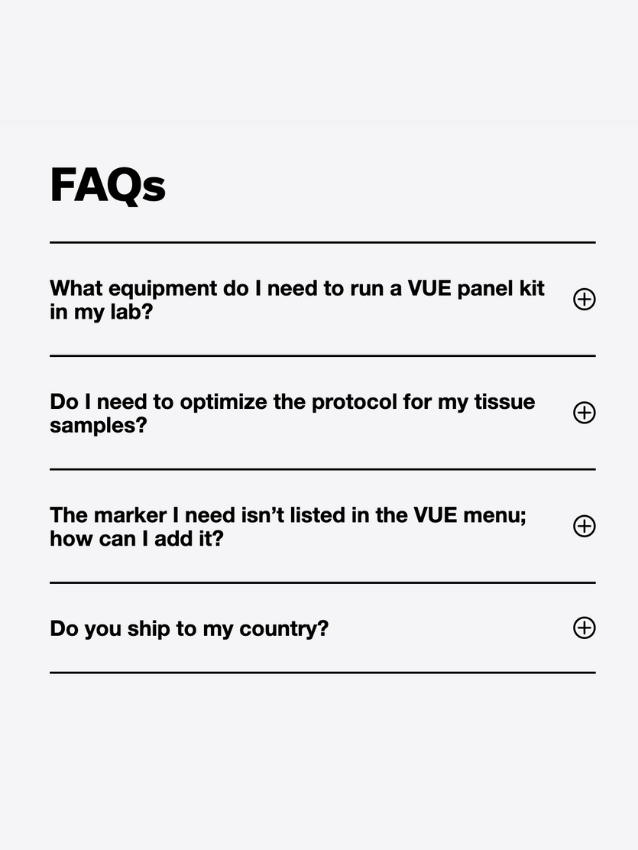Advanced Spatial Immunoprofiling with High Precision and Accuracy
Through direct labeling and visualization of antigen target sites, InSituPlex® (ISP) assays provide enhanced sensitivity and specificity of biomarker detection. The proprietary signal amplification mechanism of ISP assays provide 30x greater signal-to-noise ratios than conventional immunofluorescence assays, while biomarker performance being concordant with the current clinical gold standard assay, DAB. Biomarker detection is highly consistent across multiple independent runs and multiple lots of reagents with coefficients of variance less than 20%.
Pre-validated Biomarkers and Panels: Fast and Agile Hypothesis Verification
OmniVUE™ panels with completely validated biomarkers offer complete flexibility in panel design so that researchers can assemble their panel of choice by selecting any combination of biomarkers from the core menu. With robust manufacturing and QC processes and GCLP-compliant operations, pre-optimized, ready-to-use kits with quantitatively verified reagents can be delivered within 4 weeks of request. This enables rapid deployment and refinement of custom biomarker panels for hypothesis verification and significantly accelerates translational research.
Custom Biomarkers and Panels: 70% Reduced Research Timelines
Unlike traditional biomarker detection technologies which require 6-9 months to develop custom biomarkers and panels, the modularity and simplicity of ISP technology reduces custom marker and panel development timelines to 6-8 weeks.
High-throughput Spatial Profiling with Existing Pathology Infrastructure
ISP assay reagents have been completely optimized for manual as well as high-throughput operation on automated staining systems such as BOND RX by Leica Biosystems. Fast and gentle ISP staining assay protocols allow streamlined processing of up to 30 tissue sections in less than 6 hours, while preserving tissue integrity for downstream applications like same-slide H&E staining, multi-omics, and more.
AI-enhanced State-of-the-Art Spatial Image Data Science at Scale
STARVUE™ image data science platform deploys robust, pre-validated deep-learning based models for tissue detection and segmentation, cell segmentation and biomarker classification. AI-enhanced biomarker detection focusing on biomarker expression patterns along with signal intensities, eliminate the need for manual, inconsistent, thresholding-based approaches. The modular architecture of STARVUE enables simple yet completely adaptable complex spatial phenotyping for exploratory analysis. The integrated cloud-based infrastructure supports highly scalable whole-slide image analysis of 100’s of slides per hour, thus increasing analytical productivity by up to 100x.
Integrated Lifecycle from Samples to High-Confidence Biological Insights
- ISP Assay: Modularity and precision enables whole-slide tissue processing with customized biomarker panels within weeks.
- UltiStacker.AI™: Co-registration of multiple rounds of immunofluorescent and brightfield images of the same section with micron-level accuracy.
- UltiAnalyzer.AI™: Advanced cellular phenotyping through deep-learning based whole-slide image analysis, with high precision at scale.
- STARVUE™: Deep quantitative understanding of intercellular dynamics between complex cellular phenotypes within the tumor microenvironment.
The Result: An end-to-end solution for gaining high-confidence spatial insights from precious pathological samples, supporting in-depth investigations of biological hypotheses for translational and clinical research.
VUE Biomarker Panels

Ultivue’s proprietary InSituPlex® technology uses direct, isometric amplification of antibody-linked DNA barcodes to generate quantitatively consistent signals from multiple markers simultaneously.
OmniVUE™ (Core Biomarkers)
U-VUE® (Custom Biomarkers)
Murine U-VUE® (Core Biomarkers)
Assay Development & Services

Our Custom Assay Development Services accelerate your research team’s path to precise visualization and robust analysis of proteins in the tissue microenvironment.
Spatial Image Analysis

STARVUE™ Spatial Image Analysis pipeline uses Generative AI and advanced analytics to unlock precise, quantitative insights into the spatial biology of tumor microenvironments.















